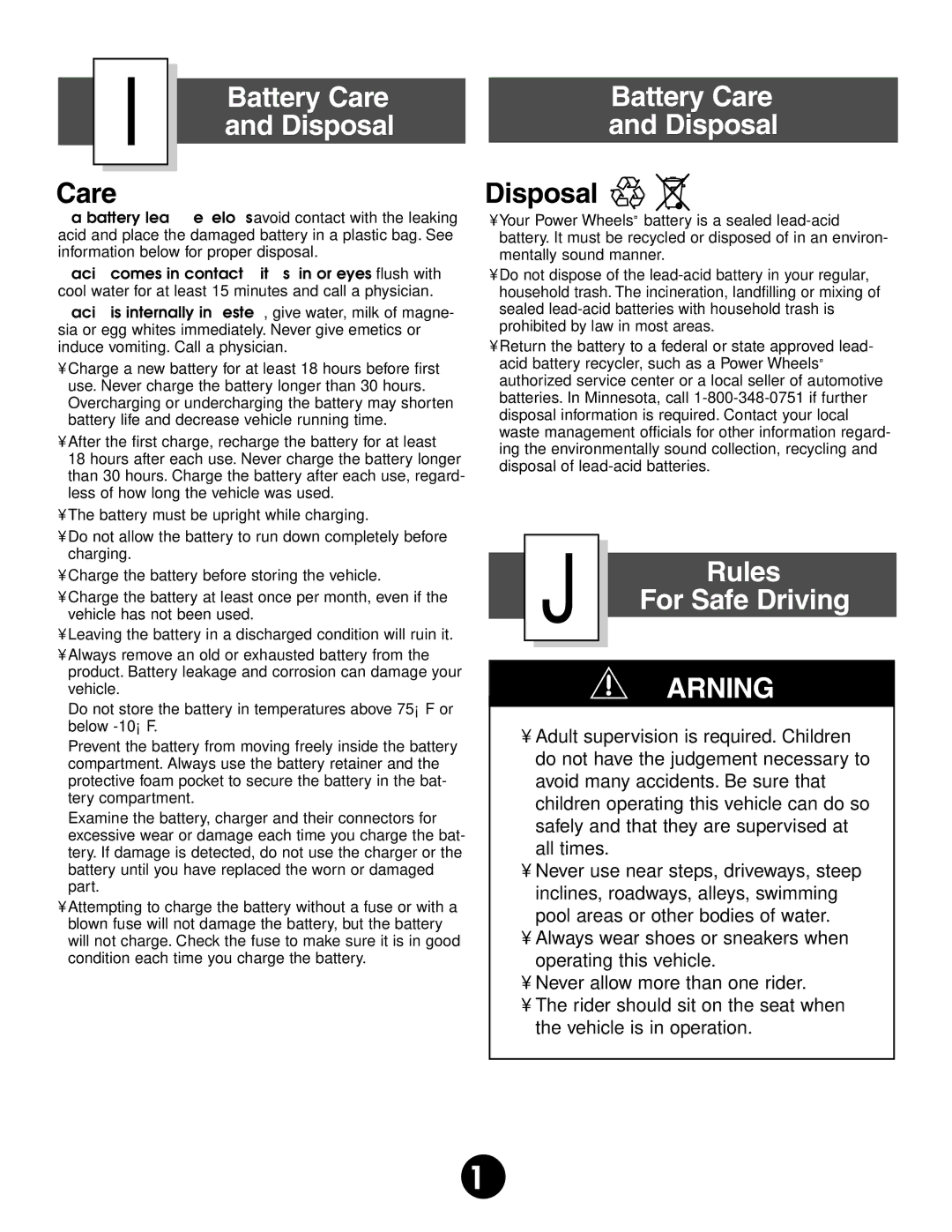
|
| I |
|
|
|
|
|
|
|
| |
|
|
|
| Battery Care | |
|
|
|
| and Disposal | |
|
|
|
|
|
|
|
|
|
|
|
|
Care
If a battery leak develops, avoid contact with the leaking acid and place the damaged battery in a plastic bag. See information below for proper disposal.
If acid comes in contact with skin or eyes, flush with cool water for at least 15 minutes and call a physician.
If acid is internally ingested, give water, milk of magne- sia or egg whites immediately. Never give emetics or induce vomiting. Call a physician.
•Charge a new battery for at least 18 hours before first use. Never charge the battery longer than 30 hours. Overcharging or undercharging the battery may shorten battery life and decrease vehicle running time.
•After the first charge, recharge the battery for at least
18 hours after each use. Never charge the battery longer than 30 hours. Charge the battery after each use, regard- less of how long the vehicle was used.
•The battery must be upright while charging.
•Do not allow the battery to run down completely before charging.
•Charge the battery before storing the vehicle.
•Charge the battery at least once per month, even if the vehicle has not been used.
•Leaving the battery in a discharged condition will ruin it.
•Always remove an old or exhausted battery from the product. Battery leakage and corrosion can damage your vehicle.
•Do not store the battery in temperatures above 75° F or below
•Prevent the battery from moving freely inside the battery compartment. Always use the battery retainer and the protective foam pocket to secure the battery in the bat- tery compartment.
•Examine the battery, charger and their connectors for excessive wear or damage each time you charge the bat- tery. If damage is detected, do not use the charger or the battery until you have replaced the worn or damaged part.
•Attempting to charge the battery without a fuse or with a blown fuse will not damage the battery, but the battery will not charge. Check the fuse to make sure it is in good condition each time you charge the battery.
Battery Care
and Disposal
Disposal 

•Your Power Wheels® battery is a sealed
•Do not dispose of the
•Return the battery to a federal or state approved lead- acid battery recycler, such as a Power Wheels® authorized service center or a local seller of automotive batteries. In Minnesota, call
|
| J |
|
|
|
|
|
|
|
| |
|
|
|
| Rules | |
|
|
|
| For Safe Driving | |
|
|
|
|
|
|
|
|
|
|
|
|
![]() WARNING
WARNING
•Adult supervision is required. Children do not have the judgement necessary to avoid many accidents. Be sure that children operating this vehicle can do so safely and that they are supervised at all times.
•Never use near steps, driveways, steep inclines, roadways, alleys, swimming pool areas or other bodies of water.
•Always wear shoes or sneakers when operating this vehicle.
•Never allow more than one rider.
•The rider should sit on the seat when the vehicle is in operation.
19
